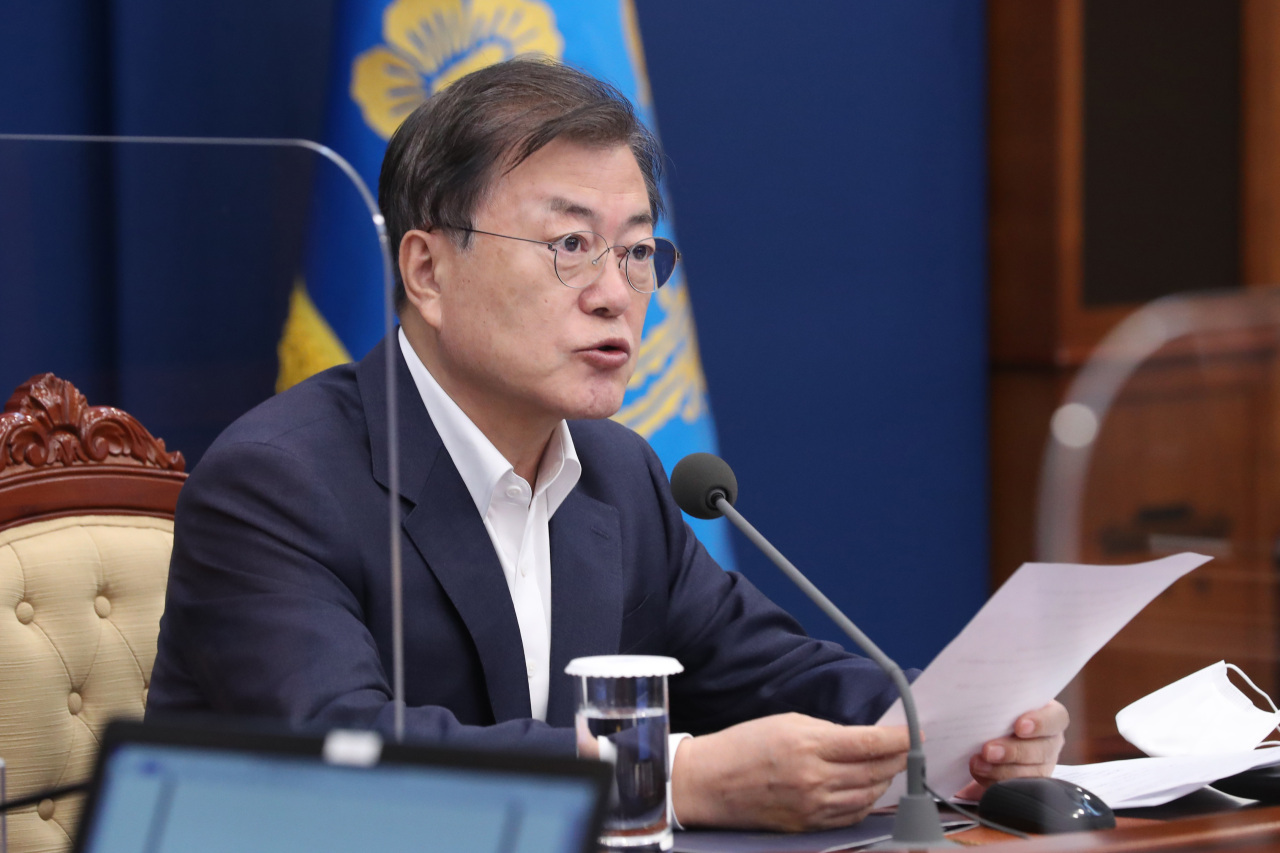More than 80% of Koreans call for recalibration of Moon's policy direction
By YonhapPublished : April 8, 2021 - 17:28

More than 80 percent of South Koreans share the view that the Moon Jae-in government needs to recalibrate the direction of its key state administration policies, a poll showed Thursday.
According to the poll of 1,004 people earlier this week, 86 percent said the Moon government's policy direction should be partially or entirely changed after Wednesday's mayoral by-elections in Seoul and Busan.
Fifty-one percent said the Moon government can maintain the basic direction of its major state policies while revising some of them. Another 35 percent said it should completely recalibrate the direction of its state policies.
Only 5 percent agreed to the view that the government's policy direction should be maintained.
The poll was jointly conducted by four local pollsters -- Embrain Public, KSTAT Research, Korea Research International and Hankook Research -- from Monday to Wednesday and released after opposition candidates won landslide victories in the Seoul and Busan by-elections, due mainly to growing public discontent about a recent surge in rents and housing prices.
Asked to evaluate the Moon government's real estate policies, 46 percent said they are very wrong and another 34 percent said they are wrong.
Views that the incumbent government has been doing very well or well with its real estate policies were shared by 2 percent and 13 percent, respectively.
Moon's five-year term is to end in May next year. The poll has a margin of error of plus or minus 3.1 percentage points, with a confidence level of 95 percent.
Asked to pick issues the Moon government should focus on for the remainder of its term, 29 percent cited economic revitalization, followed by stabilization of the real estate market (24 percent), anti-COVID-19 measures and securing of vaccines (23 percent), cooperation with opposition parties (10 percent) and welfare and distribution policies (7 percent). (Yonhap)
According to the poll of 1,004 people earlier this week, 86 percent said the Moon government's policy direction should be partially or entirely changed after Wednesday's mayoral by-elections in Seoul and Busan.
Fifty-one percent said the Moon government can maintain the basic direction of its major state policies while revising some of them. Another 35 percent said it should completely recalibrate the direction of its state policies.
Only 5 percent agreed to the view that the government's policy direction should be maintained.
The poll was jointly conducted by four local pollsters -- Embrain Public, KSTAT Research, Korea Research International and Hankook Research -- from Monday to Wednesday and released after opposition candidates won landslide victories in the Seoul and Busan by-elections, due mainly to growing public discontent about a recent surge in rents and housing prices.
Asked to evaluate the Moon government's real estate policies, 46 percent said they are very wrong and another 34 percent said they are wrong.
Views that the incumbent government has been doing very well or well with its real estate policies were shared by 2 percent and 13 percent, respectively.
Moon's five-year term is to end in May next year. The poll has a margin of error of plus or minus 3.1 percentage points, with a confidence level of 95 percent.
Asked to pick issues the Moon government should focus on for the remainder of its term, 29 percent cited economic revitalization, followed by stabilization of the real estate market (24 percent), anti-COVID-19 measures and securing of vaccines (23 percent), cooperation with opposition parties (10 percent) and welfare and distribution policies (7 percent). (Yonhap)










![[From the Scene] Monks, Buddhists hail return of remains of Buddhas](http://res.heraldm.com/phpwas/restmb_idxmake.php?idx=644&simg=/content/image/2024/04/19/20240419050617_0.jpg&u=20240419175937)




![[From the Scene] Monks, Buddhists hail return of remains of Buddhas](http://res.heraldm.com/phpwas/restmb_idxmake.php?idx=652&simg=/content/image/2024/04/19/20240419050617_0.jpg&u=20240419175937)

![[KH Explains] Hyundai's full hybrid edge to pay off amid slow transition to pure EVs](http://res.heraldm.com/phpwas/restmb_idxmake.php?idx=652&simg=/content/image/2024/04/18/20240418050645_0.jpg&u=20240419100350)

![[Today’s K-pop] Illit drops debut single remix](http://res.heraldm.com/phpwas/restmb_idxmake.php?idx=642&simg=/content/image/2024/04/19/20240419050612_0.jpg&u=)